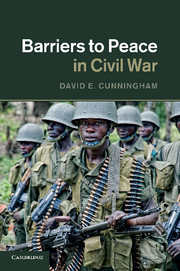Description
Barriers to Peace in Civil War
Author: Cunningham David E.
Civil wars with multiple combatants last longer and are harder to resolve. Cunningham suggests a new approach to peace negotiations.
Language: English
Subject for Barriers to Peace in Civil War:
Approximative price 36.76 €
In Print (Delivery period: 14 days).
Add to cart
Barriers to Peace in Civil War
Publication date: 06-2014
Support: Print on demand
Publication date: 06-2014
Support: Print on demand
Approximative price 94.48 €
In Print (Delivery period: 14 days).
Add to cart
Barriers to peace in civil war
Publication date: 06-2011
296 p. · 15.6x23.5 cm · Hardback
Publication date: 06-2011
296 p. · 15.6x23.5 cm · Hardback
Description
/li>Contents
/li>Biography
/li>
Civil wars vary greatly in their duration. This book argues that conflicts are longer when they involve more actors who can block agreement (veto players) and identifies specific problems that arise in multi-party bargaining. Quantitative analysis of over 200 civil wars since World War II reveals that conflicts with more of these actors last much longer than those with fewer. Detailed comparison of negotiations in Rwanda and Burundi demonstrates that multi-party negotiations present additional barriers to peace not found in two party conflicts. In addition, conflicts with more veto players produce more casualties, are more likely to involve genocide and are followed by shorter periods of peace. Because they present many barriers to peace, the international community has a poor track record of resolving multi-party conflicts. David Cunningham shows that resolution is possible in these wars if peace processes are designed to address the barriers that emerge in multi-party conflicts.
1. Introduction; 2. A veto player theory of conflict bargaining; 3. Testing the effect of veto players on duration; 4. Bargaining and fighting in Rwanda and Burundi; 5. The effects of veto players on conflict severity, genocide and the duration of peace; 6. Designing peace processes in multi-party civil wars; 7. Conclusion; Appendix A; Appendix B; Works cited; Index.
David E. Cunningham is an Assistant Professor in the Department of Political Science at Iowa State University.
© 2024 LAVOISIER S.A.S.




